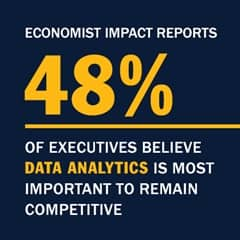Tech Skills Needed to Be an Accountant

Accounting can be traced back to early civilization. Some of the first accountants in 300 BC only used tokens and scripts to track financial information, according to the Association of Chartered Certified Accountants (ACCA).
The field has consistently evolved throughout history — and while the basics may remain the same, thanks to technology, accounting roles and processes look very different than they did 50, 25 or even 10 years ago. Understanding the landscape of current technology is an essential part of becoming an accountant.
Why Are Technology Skills Important to Accountants?
Technology is helping accountants identify and make recommendations to solve business problems. As a result, organizations can collect more data than ever.
Accountants with solid technology skills can analyze data and use it to create statistical models and visualizations that help their organizations, said Mona Stephens, CPA, an associate dean of business programs at Southern New Hampshire University (SNHU) with over 25 years of accounting experience and another two decades of experience in teaching.
 According to Dr. Jennifer Teague, executive director of business programs at SNHU with over a decade of higher education experience, accountants are also data storytellers that utilize technology to increase efficiency of manual processes, improve accuracy, perform research and analyze financial data.
According to Dr. Jennifer Teague, executive director of business programs at SNHU with over a decade of higher education experience, accountants are also data storytellers that utilize technology to increase efficiency of manual processes, improve accuracy, perform research and analyze financial data.
Technology allows accountants to access real-time data, giving clients and accounting managers the information needed to make the most accurate and relevant decisions possible. According to Stephens, technology can also help accountants with tasks such as:
- Understanding their clients' tax positions
- Managing clients' inventory and purchasing decisions
- Providing clarity on the consequences related to price changing, evolving consumer preferences and the potential impacts of opening a new location
Technology is even shifting the responsibilities of accountants.
“The automation of many repetitive tasks that used to be part of the accounting function has allowed the accountant to become more of a business advisor and strategic partner,” Stephens said.
So, What Types of Technology Are Available to Accountants?
As technology has advanced, so has the accounting field. Stephens said that areas where accountants would previously work with standard financial reporting and enterprise resource planning (ERP) systems are now being replaced with emerging technologies. Some of these emerging technologies and their roles, she said, include:
- Artificial intelligence (AI) and robotics help automate repetitive tasks.
- Blockchain validates and maintains records of secured transactions.
- Cloud computing provides accountants access to their systems from various locations creating an easier way to share information between employees, clients and stakeholders.
- Data analytics enables accountants to create reports and dashboards that often reflect live data and can be used for decision-making and reflection.
- The Internet of things (IoT) provides the collection and access of live data from various sources, such as radio frequency identity (RFID) chips, scanners and other internet-connected sensors and devices.

Cloud computing, in particular, is one technology that's becoming a priority among accounting firms, according to a 2024 U.S. Accounting Industry report by Wolters Kluwer Tax & Accounting. Of the firms who have shifted to cloud-based tools, 71% noted improved profits, the report noted.
Looking to the future, another survey noted that 48% of executives believe that advanced data analytics is the most important technology to harness in order to remain competitive long term, according to an Economists Impact report (PDF source). The survey also showed that executives believe other leading technologies, such as blockchain (35%), AI/machine learning (34%), IoT (33%) and robotic processing (29%), were also important for long-term planning.
Other technologies used in accounting include ERP tools such as Quickbooks, Sage 50 (formerly Peachtree), SAP and Oracle Netsuite, Stephens said. This technology also comes with various other tools that accountants now have at their disposal.
According to Stephens, these are some other tools and their roles that accountants may utilize:
- Data analytics software helps visualize the results of transactions, identify unusual events and trends, and better understand customers, employees, products, vendors and markets. Examples of this software include Tableau, PowerBI and Alteryx.
- Excel allows users to create and manipulate worksheets while preparing visualizations, creating descriptive statistics and performing audit analytics and what-if scenarios.
- Python is a programming language that reads structured and unstructured data and allows users to work with larger datasets. Users can pull specific data and clean, merge, recode and create programs for various analytical needs.
- Structured query language (SQL) is a coding language used to access data within datasets and databases.
Stephens said accountants must also be aware of cybersecurity and the risks of relying on technology. But, whether you're currently a certified public accountant (CPA) or improving your accounting and finance skills to become one, technology will most likely become an integral part of your journey.
Find Your Program
Learning Technology Skills as a CPA
As a CPA, you can work in various organizations and have your own practices and clients. While the technology you may use depends on your specialization, having a technology background can give you a boost over potential competition
In 2024, the CPA exam changed and began testing the technology skills being used by accountants, according to the National Associate of State Boards of Accountancy (NASBA). Passing the CPA exam can show employers you have the skill sets, competencies and knowledge of emerging technologies.

“As CPA firms rely more on technology and data analytics, they need more staff with those technology (and) analytics skills,” Stephens said
“CPAs are required to have a certain number of hours of continuing professional education (CPE) from approved National Association of State Boards of Accountancy (NASBA) to retain their licenses,” Stephens said. “Each state sets its own hours and requirements.”
But don’t worry. There are plenty of ways that you can continue to improve your technology skills after becoming a CPA.
For example, New Hampshire requires you to have 120 hours of CPE every three years, while California requires 80 hours every two years, according to FurtherEd. You can do your own research to determine what your potential CPE needs could be.
Stephens said continuing education is the best way to improve your technology skills.
“There are numerous NASBA-approved organizations that offer courses on different technologies,” she said. For instance, the AICPA offers technology courses, as well as many other professional accounting associations, including:
- American Accounting Association (AAA)
- Association of Certified Fraud Examiners (ACFE)
- Institute of Management Accountants (IMA)
“There are also a lot of free services online that have training for different technologies,” Stephens said.
Whatever your accounting specialization may be there are several ways for you to build technology skills and stay current with what's available today and into the future.
A degree can change your life. Find the SNHU accounting program that can best help you meet your goals.
Nicholas Patterson ’22 ’25MFA is a writer based in West Michigan with several years of experience as a content creator in higher education. He’s an alumnus of Southern New Hampshire University (SNHU), where he earned both his bachelor’s in English and creative writing and his Master of Fine Arts in Creative Writing. When his head’s not in novels, you can find him outside dreaming up his own stories. Connect with him on LinkedIn.
Explore more content like this article

For Jazzmen Shipp, Earning a Degree Changed Everything

How Kellsie Goodhart-Jones Earned an MBA While Working for the US Air Force

What Jobs Can You Get with a Business Degree?
About Southern New Hampshire University

SNHU is a nonprofit, accredited university with a mission to make high-quality education more accessible and affordable for everyone.
Founded in 1932, and online since 1995, we’ve helped countless students reach their goals with flexible, career-focused programs. Our 300-acre campus in Manchester, NH is home to over 3,000 students, and we serve over 135,000 students online. Visit our about SNHU page to learn more about our mission, accreditations, leadership team, national recognitions and awards.


